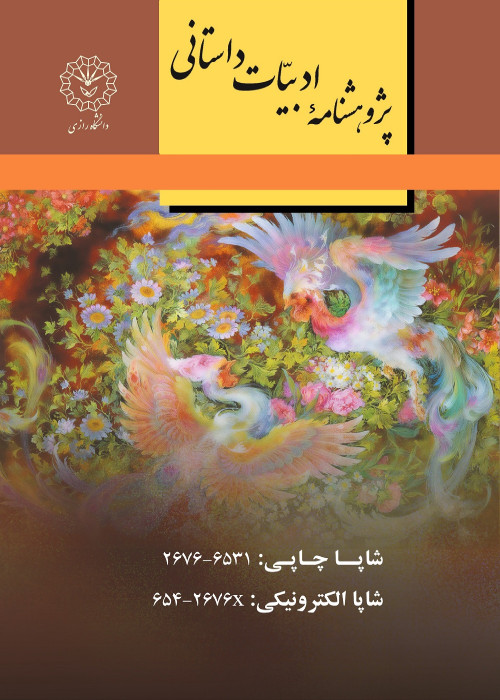Propositions of Postcolonial Feminism in the Novel Pruning
Author(s):
Article Type:
Research/Original Article (دارای رتبه معتبر)
Abstract:
Introduction
The novel Pruning written by Nasim Marashi is the story of the war-torn women of southern Iran who - unwillingly and despite the cultural context of the society - try to escape from the male colonialism of the war and gain their independence and natural revival. The main subject of this article is the feminist-postcolonial reading, analytically and descriptively of the novel Pruning to show the main statements of this point of view in the said novel.Methodology
Feminism based on post-colonial ideas considers woman as a cultural construct. Post-colonial feminists consider this to be a product of women's unconsciousness and their moving away from their natural position, under the hegemony of male authoritarian discourse, and they have always sought to find a suitable place for women and invite them to self-confidence and revive their identity and personality beliefs. What masculinity and femininity are depicted in "Haras" novel shows the subjectivity and power of men and the loss and decay of female gender identity as "other" in male authority. In this article, these two characteristics of the gender ideology represented in Hares' story have been analyzed and explained by separating the components of post-colonial feminism.Results and Discussion
The novel "Pruning" succeeds in representing the gender ideology in a certain geography of the world with its own culture and customs and gender stereotypes. The theme of war and its violent consequences also plays a leading role in highlighting the views and cultural signs that shape the identity-gender structure of women and men. Brind has clearly reflected the two colonial issues, patriarchal culture and war - which in the world of nature, is considered a masculine thing by nature - the division of the male and female world and male subjectivity and female otherness in the novel. The gender identity of the women in the story (Nawal, her mother-in-law, the women of Dar al-Talah, etc.) is formed by internalizing the belief that a woman is an inferior other, and women, like men, define masculinity with traits such as stoutness, strength, and greater physical abilities (especially the power to fight) is preferable to their gender identity, which is a cultural and social construction.Conclusion
In this colonial and gendered view, being a woman is dignified by being accepted and accepted by men; Therefore, women use all their efforts to get closer to that "self" defined for them by the components of patriarchal culture and power (such as giving birth to a boy instead of a girl). In this novel, the statements of post-colonial feminism, such as returning to oneself, believing oneself as an original and natural existence (not a weakly held other), trying to redefine the original gender role and identity, coming out of the shadows and margins, recovering one's agency with a positive effect On the environment, nature and others after the unwanted separation of women from men and the patriarchal society, it makes its way into the lives of women and typically NawalKeywords:
postcolonial feminism , Pruning novel , Self , other , colonialism , gender
Language:
Persian
Published:
Research of Fictional Literature, Volume:12 Issue: 4, 2023
Pages:
1 to 21
magiran.com/p2677012
دانلود و مطالعه متن این مقاله با یکی از روشهای زیر امکان پذیر است:
اشتراک شخصی
با عضویت و پرداخت آنلاین حق اشتراک یکساله به مبلغ 1,390,000ريال میتوانید 70 عنوان مطلب دانلود کنید!
اشتراک سازمانی
به کتابخانه دانشگاه یا محل کار خود پیشنهاد کنید تا اشتراک سازمانی این پایگاه را برای دسترسی نامحدود همه کاربران به متن مطالب تهیه نمایند!
توجه!
- حق عضویت دریافتی صرف حمایت از نشریات عضو و نگهداری، تکمیل و توسعه مگیران میشود.
- پرداخت حق اشتراک و دانلود مقالات اجازه بازنشر آن در سایر رسانههای چاپی و دیجیتال را به کاربر نمیدهد.
In order to view content subscription is required
Personal subscription
Subscribe magiran.com for 70 € euros via PayPal and download 70 articles during a year.
Organization subscription
Please contact us to subscribe your university or library for unlimited access!



